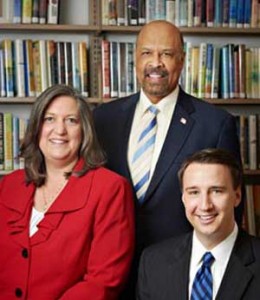Plan to impose costs on municipalities met spirited criticism
By Kathleen Brady Shea, Managing Editor, The Times

Commissioners Kathi Cozzone (from left), Terence Farrell and Ryan Costello will not pursue a 9-1-1 cost-recovery plan proposed last month.
The county commissioners announced yesterday that they will not advance a contentious proposal introduced in June to impose a cost-
recovery fee for emergency services on the county’s 73 municipalities.
The plan to defray about $2.6 million of the county’s burgeoning 9-1-1 expenses with a per-capita tax of about $5.20 per resident generated sharp criticism from municipal officials, who packed a commissioners’ meeting last month to express opposition.
“As a result of feedback and correspondence with many municipalities, and numerous discussions with CCATO (Chester County Association of Township Officials) officials, borough representatives and first responders, the Chester County Commissioners have reviewed the proposed method of the municipality cost recovery plan, originally determined on a population basis, and have decided that this method for cost recovery will not be pursued,” said a letter to municipalities from Mark Rupsis, the county’s chief operating officer. “No further discussion or vote on this method of recovery will take place at next week’s scheduled commissioners’ sunshine and regular meetings (July 24 and 25).”
The letter said the county will continue to “to review additional methods of municipality cost recovery for the investment being made in the many emergency services projects and the upgrading of major equipment … Any resulting proposal for cost recovery will be communicated to you and discussed in a future commissioners’ sunshine meeting, prior to a vote at a commissioners’ meeting.”
When the proposal was introduced last month, the commissioners explained that from 1975 to 1993 the county collected a cost-recovery fee for emergency services, imposing a three-year moratorium in 1993 so that municipalities could purchase radios. The fee was never reinstated.
The commissioners suggested that returning to such an arrangement represented a fair approach to reducing an inevitable county tax increase, especially because many municipalities show a surplus, according to state records. Many municipal leaders, who criticized the county’s failure to give them adequate advance notice of the plan, countered that those funds have either already been spent or earmarked for critical capital needs.






